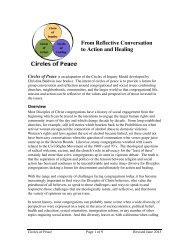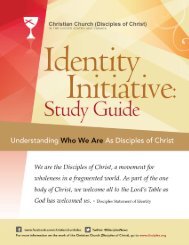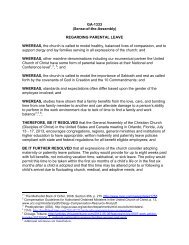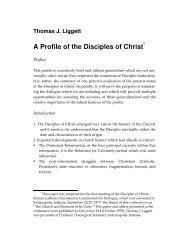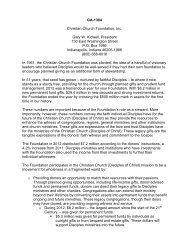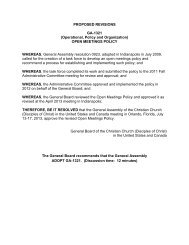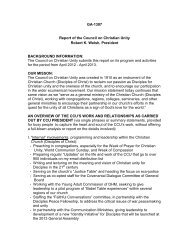RESOURCING THE CHURCH FOR ECUMENICAL MINISTRy A ...
RESOURCING THE CHURCH FOR ECUMENICAL MINISTRy A ...
RESOURCING THE CHURCH FOR ECUMENICAL MINISTRy A ...
You also want an ePaper? Increase the reach of your titles
YUMPU automatically turns print PDFs into web optimized ePapers that Google loves.
Rev. Nathan D. Wilson is Senior Minister of First<br />
Christian Church (Disciples of Christ) in Shelbyville, Indiana.<br />
What I propose to do this afternoon—not least<br />
hopefully to keep you awake!—is present eight<br />
or nine ideas for our discussions and documents.<br />
It’s quite clear that unity among Christians was<br />
central to the genesis of our denomination. Within<br />
or beyond this room, there’s little credible dispute<br />
about that. Unity among believers was central, or<br />
polar as the case may be. That I think is clear.<br />
What it is quite unclear, though, is whether unity is<br />
anywhere close to being a central priority for us as a<br />
denomination today. And what is even less clear<br />
than unclear is where among the pecking order<br />
issues of unity will fall in our near and long term<br />
future. In terms of seminary curricula, for instance,<br />
how much attention is devoted to matters of<br />
ecumenism? Is it restricted to history courses, or<br />
even history and theology courses? Or is the renewal<br />
of the church also a part of ethics classes alongside<br />
discussion about the reconciliation of humanity?<br />
More fundamentally, are we challenging new and<br />
aspiring clergy to consider where they root their<br />
self-identities as ministers: in the gospel or in a<br />
denomination?<br />
Let me try this same point from a slightly different<br />
direction. I am privileged to serve on a nurture and<br />
certification team in the Indiana region. These are<br />
5-6 person groups who accompany students<br />
through seminary, field education and the ordination<br />
process. It’s something I enjoy doing because<br />
my own experience as a seminarian—with a different<br />
region—was significantly lacking, and because I<br />
often find the conversations with dedicated team<br />
members and students to be engaging. The<br />
consistent exception to this latter point is around<br />
Christian Unity<br />
and Prophetic Witness<br />
Nathan D. Wilson<br />
34<br />
any clear articulation of the ecumenical nature of<br />
Disciples or the importance of ecumenism for<br />
congregational ministry. “If I get to it” is not an<br />
atypical response when students are asked questions<br />
about being involved in ministerial associations or<br />
district meetings, regional or general church life.<br />
Charity and justice. The confusion of charity and<br />
justice is not new. From my standpoint, it’s not<br />
improving. The problem is that this confusion<br />
undermines our attempts at prophetic witness. The<br />
congregation I serve, for example, hosts a<br />
community food pantry cooperatively administered<br />
by eight congregations and individuals not<br />
associated with any congregation. It is, by far, the<br />
most significant provider of food and hygiene<br />
products in our county. Like other pantries across<br />
the country, the number of families served is<br />
considerably higher the last two years. Thankfully,<br />
we have additional volunteers willing to staff the<br />
pantry and additional donations to stock the<br />
pantry’s shelves. The commitment and energy for<br />
the pantry is strong. However, when a conversation<br />
emerges about what combination of factors cause so<br />
many to need the pantry’s food, the energy diminishes<br />
considerably. It reminds me of William Sloane<br />
Coffin, who said:<br />
Many of us are eager to respond to injustice,<br />
as long as we can do so without having to<br />
confront the causes of it. There’s the great<br />
pitfall of charity. Handouts to needy<br />
individuals are genuine, necessary responses<br />
to injustice, but they do not necessarily face<br />
the reasons for injustice. And that is why so<br />
many business and governmental leaders<br />
today are promoting charity; it is desperately<br />
needed in an economy whose prosperity is<br />
based on growing inequality. First these



